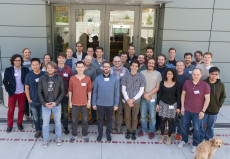Berkeley Lab Hosts Neurodata Without Borders Hackathon
April 27, 2018
Contact: Linda Vu, lvu@lbl.gov, 510.495.2402

Fifth Neurodata Without Borders: Neurophysiology (NWB:N) project hackathon at Berkeley Lab (Photo by Margie Wylie, Berkeley Lab)
Thirty-one neuroscience experts from across the country came to Lawrence Berkeley National Laboratory (Berkeley Lab) on April 26 and 27 to participate in the fifth Neurodata Without Borders: Neurophysiology (NWB:N) project hackathon.
The event was locally organized by Berkeley Lab scientists Oliver Ruebel, Andrew Tritt and Kristofer Bouchard, who led the software development of NWB:N 2.0 in close collaboration with UC San Francisco’s Loren Frank and Eddie Chang and the broader Neurodata Without Borders (NWB:N) community.
NWB:N is a consortium of researchers and foundations with a shared interest in breaking down obstacles to data use and sharing in neuroscience. The group ultimately aims to standardize neurophysiology data on an international scale to ensure the success of brain research worldwide and accelerate the pace of discovery. It was initiated by the Kavli Institute in mid-2014 in the wake of the Brain Initiative announcement.
“Some of the goals of this event were to promote the adoption of NWB:N software, train new users, work with users to integrate examples of their lab’s data into NWB:N, as well as facilitate communication between users, developers and project teams,” says Ruebel, a research scientist in CRD’s Data Analytics and Visualization Group. “The Berkeley Lab hosted hackathon is a reflection of our leadership in both the development and dissemination of the NWB:N.”
According to Bouchard, Berkeley Lab’s leadership in the NWB:N development would not be possible without the Laboratory Directed Research and Development (LDRD) project BRAINformat: A Data Standardization Framework for Neuroscience Data. By proving their concept at a hackathon in 2014, the Berkeley Lab team caught the attention of the neuroscience community and was then invited to join discussions about NWB:N and novel concepts for standardization. The team then began working on a 2.0 version of the software, called NWB:N 2.0. They presented a poster of their work 2017 Society for Neuroscience meeting in Washington D.C. and released a beta version of their software last year so that users could offer input before the version’s officially release this year. At a recent NIH BRAIN Investigators meeting in Bethesda, NWB:N 2.0
“Berkeley Lab—Oliver Ruebel and Andrew Tritt in particular—have a long history of developing sustainable, well-engineered scientific software for biologists. They have the expertise and collaborative spirit to work with a diversity of researchers,” says Bouchard. “Berkeley Lab’s extensive tradition of creating computational tools and techniques for science is one big reason why NWB:N 2.0 is poised to become a community standard.”
“A central challenge in the sharing of biological data is creating a format and software architecture that are simultaneously standardized yet extensible to new use cases to accommodate novel experimental paradigms,” says Tritt. “We believe the concepts that were developed and instantiated in the NWB:N 2.0 are general design principles for standardization of other biological data.”
About Computing Sciences at Berkeley Lab
High performance computing plays a critical role in scientific discovery. Researchers increasingly rely on advances in computer science, mathematics, computational science, data science, and large-scale computing and networking to increase our understanding of ourselves, our planet, and our universe. Berkeley Lab’s Computing Sciences Area researches, develops, and deploys new foundations, tools, and technologies to meet these needs and to advance research across a broad range of scientific disciplines.







 Instagram
Instagram YouTube
YouTube